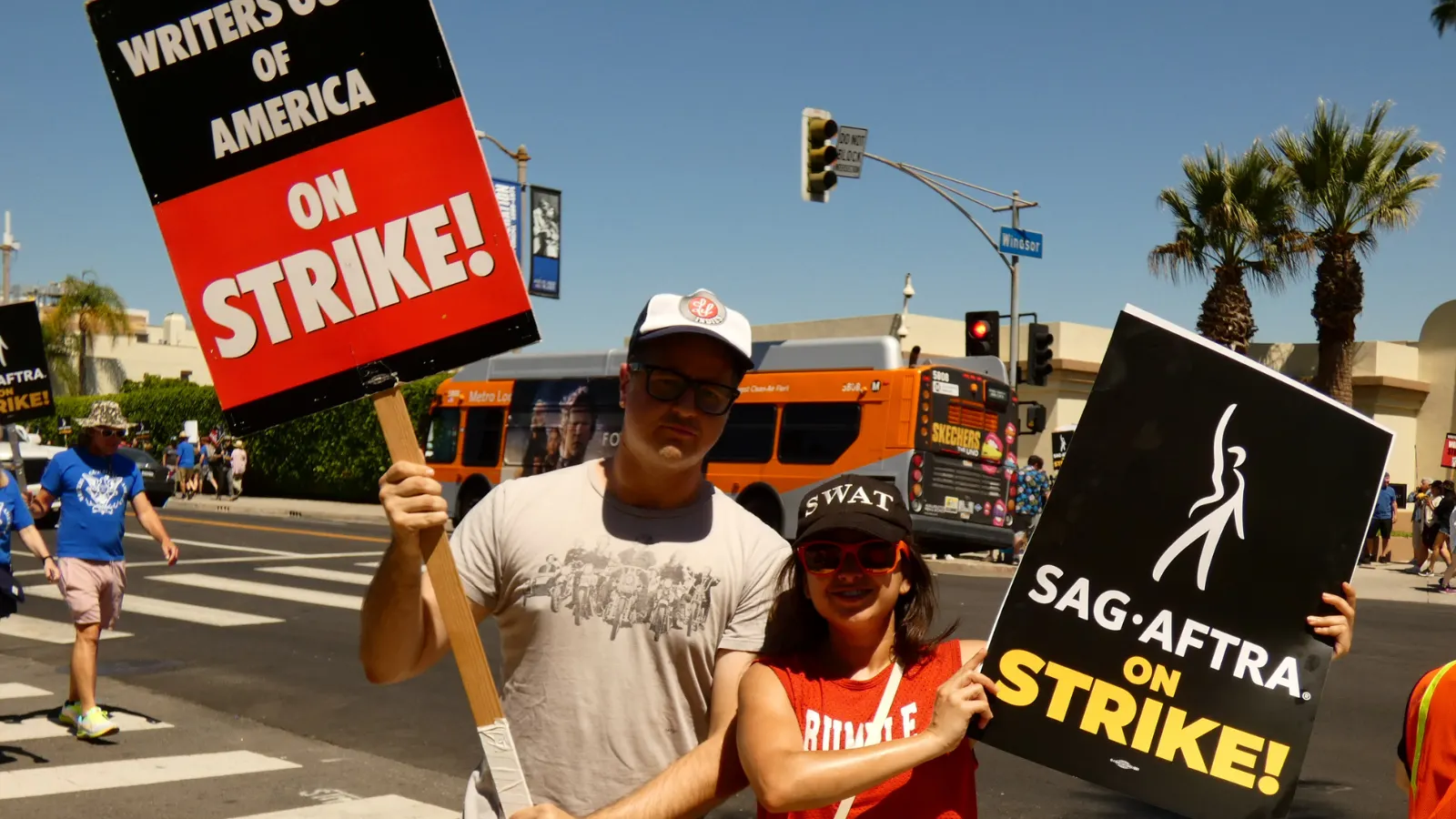About the Author
Genevieve Thiers is the CEO of Entertainmint, a new ticketing platform for collaborative creation experiences that focuses on helping indie creators monetize their content via fan engagement tickets, pay-per-view, and rental.
The views expressed here are her own and do not necessarily represent those of Decrypt.
Hollywood’s future is mired in picket lines now that the Screen Actors Guild (SAG-AFTRA) has joined the Writers Guild of America (WGA) on strike. Sometimes in a writer’s room, when facing difficulty with a plot point, the room might engage in a game of “flip the table.” This involves turning the whole premise of the show on its head, to see if new meaning shakes clear.
What’s interesting about this exercise is how well that applies to Hollywood’s current woes right now. If you flip the table on the way that streamers currently operate, several solutions to resolve the anger that has led SAG-AFTRA and WGA to go on strike become glaringly clear.
First, why are Hollywood actors and writers so angry? Tired of break-even deals, “vanishing” shows due to streamers trying to avoid residuals, and the incredible disparity between CEO salaries and actor earnings—not to mention the looming threat of AI—creators, actors, and directors are demanding their due.
The new world of blockchain and Web3 might offer an answer.
Imagine you could flip the entire system on its head and bring creators direct to fans from the get-go. Imagine if those creators could offer entry tickets into the making of their show to fans—tickets that let them have a private screening with the cast, get a collectible, or even enter the casting, writing, and production rooms to co-create and even share in royalties.
If you lower the wall between creators and fans, amazing things are possible.
"In this new era of decentralized content platforms, creators wield unprecedented power to connect directly with their fans, fostering genuine relationships and building a loyal community unencumbered by intermediaries and traditional barriers,” Leo Matchett of Decentralized Pictures told Decrypt.
The Film3 crowd certainly believes this. The Film3 tag applies to creators using a wide range of blockchain applications to build their communities, raise production funds, co-create content, and distribute completed work to audiences worldwide.
A powerful voice for this community has emerged in the form of “The Squad” on Twitter, founded by Jordan Bayne and Julian Flores.
“We’re gathering a community of filmmakers and fans from around the world who believe in the idea that people should be treated fairly, diverse stories and representation matter, and that creatives should be able to control their own destinies,” Flores said. “This ethos alone is incredibly powerful, and combined with the new tools and platforms, means the movement can really make a better future for everyone involved.”
How does this sentiment apply to industry? SAG-AFTRA and WGA creators might want to examine the burgeoning new companies, organizations, and builders popping up in the Film3 space, as their solutions are beginning to enter prime time.
For years, grants for Film3 creators have been available from organizations like Decentralized Pictures, which fosters democratic film financing via a platform-based support system that empowers storytellers and users through meritocracy, creating a new era of empowerment and creative freedom.
Various studio-based builds that lean on blockchain, like Bingeable and Gala Film, allow for transparency to rule instead of a C-level suite. Gala leans into collectibles, incorporating Web3 tech and NFTs coupled with direct audience engagement, while deploying a robust watch-to-earn model.
Bingeable’s approach is centered on financing, providing an alternative for filmmakers and financiers to market projects directly into social media streams, with transparent blockchain accounting via a “share to earn” model. Bingeable enables talent and fans to get paid a commission by selling a rental or download of a project to their fan bases.
And platforms like Beem and In.Live are doing an excellent job of providing white-labeled services for content providers that want to sell work out of their own hubs, direct to fans. Across all these new players is the potential for a new and refreshing level of fairness, as they all place creators front and center with control and revenue.
And there’s greater transparency as well, thanks to smart contracts, which hold the code that powers autonomous decentralized apps (dapps) and platforms without intermediaries.
“Smart contracts and on-chain reporting solve a number of issues that the collective bargaining agreement is trying to address,” said Joshua Frazin of networking platform Hollywoodland. “Blockchain tooling and technology, when applied to filmmaking, lets us fractionally share in the ownership of IP in a transparent way that anyone can see. That’s just not possible now.”
David Bianchi of Exertion3 Films, creator and executive producer of upcoming TV series “RZR” on Gala, agrees.
“The most important component is provenance and smart contract deployment,” said Bianchi. “Smart contracts could significantly reduce the latency and inaccuracy in residual payments to actors, and we hope in the next 3-5 years we will see Hollywood adopt blockchain technology.”
Success stories are mounting. "Calladita," an upcoming feature film by Miguel Faus adapted from his original short film (which is currently streaming on Max), was funded entirely by NFT sales. Meanwhile, "Project Iceman" by Yes Theory turned down $1.25 million from a major streaming service, and instead was successfully funded via NFT sales.
Is this solution perfect? Not yet.
While some scrappy creators have been able to make whole shows within these new platforms, most are simply using them as a form of pre-sales to bolster an overall fundraise. But it’s an answer in a vast arena where there have been no satisfying answers to date.
“I think this is the way all storytelling will be done in the near future,” said creator and producer Sherry McCracken of the Never Alone Xperience. “It used to be the streamers that were the upstarts. Now it’s us.”

